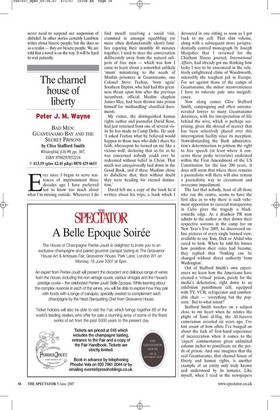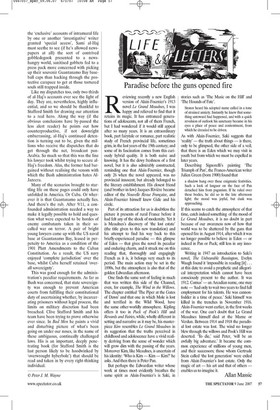The charnel house of liberty
Peter J. M. Wayne BAD MEN: GUANTANAMO BAY AND THE SECRET PRISONS by Clive Stafford Smith Weidenfeld, £16.99, pp. 307, ISBN 9780297852216 £13.59 (plus £2.45 p&p) 0870 429 6655 Ever since I began to serve sentences of imprisonment three decades ago I have preferred not to know too much about what I'm missing outside. Whenever I do find myself receiving a social visit, crammed in amongst squabbling (or more often dysfunctionally silent) families enjoying their monthly 40 minutes together, I tend to steer the conversation deliberately away from the natural subjects of free men — which was how I came to learn about a somewhat unlikely 'imam' ministering to the needs of Muslim prisoners in Guantanamo, one Colonel Steve Feehan, 'born again' Southern Baptist, who had had this greatness thrust upon him after the previous incumbent, official Muslim chaplain James Mee, had been thrown into prison himself for 'mishandling' classified documents.
My visitor, the distinguished human rights author and journalist David Rose, had just returned from one of several visits he has made to Camp Delta. He said: 'I asked Feehan what he believed would happen to those men who didn't share his faith, whereupon he turned on me like a vicious wolf, declaring that so far as he was concerned nobody could ever be redeemed without belief in Christ. That much was unequivocally laid down in the Good Book, and if these Muslims chose to disbelieve that, then without doubt they were heading for eternal damnation.'
David left me a copy of the book he'd written about his trips, a book which I devoured in one sitting as soon as I got back to my cell. That slim volume, along with a subsequent more jurisprudentially centred monograph by Joseph Margolies that I reviewed for the Chatham House journal, International Affairs, had already got me thinking how lucky I was to be ensconced in the relatively enlightened clime of Wandsworth, ostensibly the toughest jail in Europe. For set against those of the camps of Guantanamo, the minor inconveniences I have to tolerate pale into insignificance.
Now along comes Clive Stafford Smith, campaigning and often unremunerated lawyer to many Guantanamo detainees, with his interpretation of life behind the wire, which is perhaps surprising, given the shroud of secrecy that has been selectively placed over this interrogation facility since its inception. Notwithstanding the Bush administration's determination to jettison the right to free speech (at least where it concerns these pesky terrorists) enshrined within the First Amendment of the US Constitution for the last 200 years, it does still seem that where there remains a journalistic will there will also remain a journalistic way to circumvent and overcome impediment.
The fact that nobody, least of all those who run the centre, seems to have the first idea as to why there is such vehement opposition to carceral transparency in Cuba gives the tragedy a blackcomedic edge. As a drunken PR man admits to the author as they drown their respective sorrows in the camp bar on New Year's Eve 2005, he discovered online pictures of every single banned view, available to any Tom, Dick or Abdul who cared to look. When he told his bosses how pointless their rules had become, they replied that 'Nothing can be changed without direct authority from Washington'.
Out of Stafford Smith's own experiences we learn how the Americans have created a 'virtual' prison, purely for the media's delectation, right down to an exhibition punishment cell, equipped with TV, VCR, refrigerator and comfortable chair — 'everything but the popcorn.' But to what intent?
Stafford Smith touches on a subject close to my heart when he relates the plight of Sami al-Haj, the Al-Jazeera cameraman arrested six years ago. I've lost count of how often I've banged on about the lack of first-hand experience of incarceration when it comes to the 'expert' commentators given unlimited column inches to pontificate on the perils of prison. And one imagines that the real Guantanamo, that charnel house of liberty and human rights, is another example of an entity only truly known and understood by its inmates. Like myself, when I read in the newspapers the 'exclusive' accounts of intramural life by one or another 'investigative' writer granted 'special access', Sami al-Haj must seethe to see (if he's allowed newspapers at all) the sort of contrived gobbledegook presented to a newshungry world, sanitised gobbets fed to a press pack more concerned with picking up their souvenir Guantanamo Bay baseball caps than hacking through the protective carapace to get at those tortured souls still trapped inside.
Like my dispatches too, only two thirds of al-Haj's accounts ever see the light of day. They are, nevertheless, highly influential, and so we should be thankful to Stafford Smith for drawing our attention to a real hero. Along the way (if the obvious conclusions have by-passed the less alert reader) he points out how counterproductive, if not downright embarrassing, al-Haj's continued detention is turning out to be, given the millions who receive the dispatches that do get through the net, broadcast panArabia. So much so that this was the line his lawyer took whilst trying to secure alHaj's freedom. Alas, the former had bargained without realising the venom with which the Bush administration hates AlJazeera.
Many of the scenarios brought to startling life on these pages could only have unfolded in America. Or Cuba. Or wherever it is that Guantanamo actually lies. And there's the rub. After 9/11, a confounded administration needed a way to make it legally possible to hold and question what were expected to be hordes of enemy combatants taken in their socalled war on terror. A pair of bright young lawyers came up with the US naval base at Guantanamo Bay, leased in perpetuity to America as a condition of the 1901 Platt Amendments to the Cuban Constitution. As a result, the US navy enjoyed 'complete jurisdiction' over the base, whilst Cuba herself retained 'overall sovereignty'.
This was good enough for the administration's peculiar requirements. As far as Bush was concerned, that state sovereignty was enough to prevent American courts from fulfilling their constitutional duty of ascertaining whether, by incarcerating prisoners without legal process, the limits on military discretion had been breached. Clive Stafford Smith and his team have been trying to prove otherwise ever since. In Bad Men he paints a vivid and disturbing picture of what's been going on under our noses, in the name of these ambiguous, continually challenged laws. His is an important, deeply penetrating book (for Stafford Smith is the last person likely to be hoodwinked by 'overwrought hyberbole') that should be read and taken in by every right-thinking individual.
©PeterJ.M. Wayne www.spectator.co.uk





























































 Previous page
Previous page